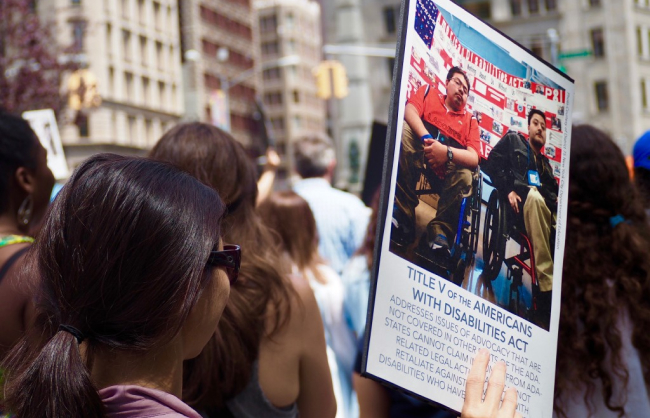For many people with disabilities, routine airline travel, including getting to the gate and on and off the plane, remains a nightmare in the US, according to responses received by a question posed on social media by the U.S. media outlet NPR.
Although Congress demanded in 2018 that airlines and the Transportation Security Administration (TSA) make flying easier for people with disabilities, passengers reported that the same problems continue to exist.
On a trip in 2020, Heather Leiterman, who is blind, was told by a TSA agent to take the harness, collar, and leash off her guide dog, a black Labrador named Coastie. She explained to the agent that to do so would mean she’d lose control of the animal.
But the agent insisted — even though the TSA’s own procedures say those items “do not require removal” for screening. “He was very hostile,” Leiterman says, and threatened not to let her on the plane if she didn’t comply.
When she called the TSA customer service line the next day, she says the officer on the phone refused to take her complaint.
“Stepping into an airport, I feel a sense of anxiety wash over me,” said college student Nathaniel Ross. Ross explained that he has “several physical disabilities” that require him to use implanted medical devices, including a feeding tube in his stomach and an intravenous line inserted under his chest wall.

Ross says the devices and the intravenous fluids he travels with often confuse agents. In 2019, when he was 18, he made multiple trips to and from Arizona and an Ohio children’s hospital for treatment. The bags of liquid — which need to be kept sterile and at a controlled temperature in a special container with ice packs — were X-rayed, opened, and underwent an extended examination, he says.
Ross was then subjected to a pat-down “of the two open holes in my chest and stomach” — in front of other passengers. Then, in private, he got a second more intrusive and “humiliating” pat-down “in all areas” of his body.
His story and Heather Leiterman’s experience are just two of the more than 225 responses that NPR received to their social media call-out. Other complaints included stories of wheelchairs broken in transit, airport escorts who never showed up, children with autism separated from their parents at security gates, and pat-downs that felt like sexual assaults.
In its 2018 FAA Reauthorization Act, Congress told airlines and the TSA to fix air-travel problems like these and demanded more training, better and faster services, and improved care of equipment such as wheelchairs.
The act required the TSA to add training for how to handle the different needs of passengers with disabilities. One in four U.S. adults has a disability, according to the Centers for Disease Control and Prevention, and to understand various disabilities requires comprehensive and repeated training.
The TSA has extended all training of newly-hired TSA agents from two weeks to three, including instruction on how to screen people with disabilities and medical conditions, according to a TSA official. Then, at work, agents and supervisors talk about how to respond to specific situations, including dealing with disability issues.
Still, most of the complaints that NPR received from passengers were the result of agents not following such training. “Our front-line officers have a very difficult job,” says Jose Bonilla, executive director of the TSA’s Traveler Engagement Division. Protecting “physical security” comes first, but he notes there’s a growing demand for agents to create a “culture of dignity and respect. And that’s something that we’ve been driving very hard to achieve.”

